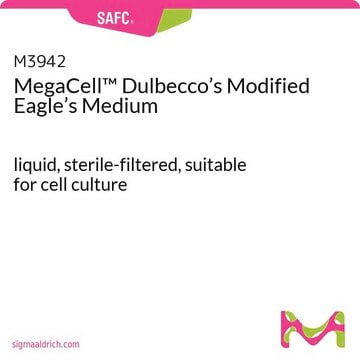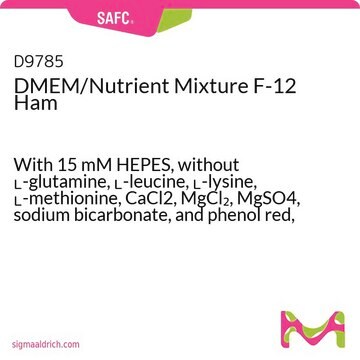D9443
Dulbecco′s Modified Eagle′s Medium - low glucose
liquid, sterile-filtered, suitable for cell culture, designed for isotope labeling in cell culture applications
Synonym(s):
DME, DMEM
About This Item
Recommended Products
description
With 1000mg/L D-glucose, L-glutamine, and sodium bicarbonate. Without arginine, leucine, lysine, sodium pyruvate, and phenol red
sterility
sterile-filtered
form
liquid
technique(s)
cell culture | mammalian: suitable
impurities
endotoxin, tested
components
NaHCO3: 3.7 g/L
sodium pyruvate: no
glucose: 1.0 g/L
L-glutamine: 0.584 g/L
phenol red: no
HEPES: no
shipped in
ambient
storage temp.
2-8°C
Looking for similar products? Visit Product Comparison Guide
Reconstitution
Supplement with 0.100 g/L L-Arginine-13C6, 15N4 HCl (Product 608033), 0.100 g/L L-Leucine-13C6, 15N (Product 608068), and 0.100 g/L L-Lysine-13C6, 15N2 (Product 608041).
also commonly purchased with this product
Storage Class Code
10 - Combustible liquids
WGK
WGK 3
Flash Point(F)
Not applicable
Flash Point(C)
Not applicable
Certificates of Analysis (COA)
Search for Certificates of Analysis (COA) by entering the products Lot/Batch Number. Lot and Batch Numbers can be found on a product’s label following the words ‘Lot’ or ‘Batch’.
Already Own This Product?
Find documentation for the products that you have recently purchased in the Document Library.
Customers Also Viewed
Our team of scientists has experience in all areas of research including Life Science, Material Science, Chemical Synthesis, Chromatography, Analytical and many others.
Contact Technical Service






